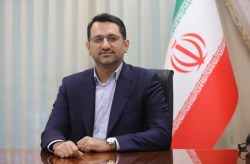During his inauguration ceremony, the CEO emphasized that free zones were initially established to accelerate economic growth, attract investment, and support export-oriented production and services. He noted, “Free zones were intended to have simple and agile administrative processes, filled with effective and targeted incentives and exemptions—not to lose their advantages and face capital flight.”
He questioned, “What differentiates a free zone from the mainland?” and added, “The laws governing free zones were designed to facilitate business, but unfortunately, we have lost many of our assets. Progressive laws for free zones, such as the Free Zones Management Act and Article 65 of the Permanent Development Law, have been burdened with additional regulations.”
Kabiri stressed that “development flourishes in the soil of peace and stability” and that Kish should represent stability-driven development for both domestic and international investors. He highlighted the need for comprehensive planning to transform Kish into a seventh-generation free zone and emphasized leveraging economic diplomacy and balanced trade cooperation with neighboring countries to position Kish as an economic powerhouse.
He expressed optimism about the recent appointment of a visionary economist as Minister of Economy and an experienced leader as Secretary of the High Council of Free Zones, stating, “This brings hope that free zones will regain their intended functionality.” He outlined three priorities for improving conditions for entrepreneurs and investors: developing Kish’s infrastructure, reforming processes and regulations, and providing targeted support and incentive packages.
Kabiri also emphasized the importance of revising and refining processes and regulations, enhancing transparency through digital governance, and creating a single-window system to establish a healthy and accessible environment for investors. He mentioned plans to engage in discussions with relevant authorities to reform tax and customs policies in free zones and to partially offset domestic and foreign investors’ investments through targeted incentive packages.
He underlined the necessity of developing Kish’s infrastructure, including investments in air and sea transport, energy, and internet, noting, “With the support of the Minister of Economy, Kish Air must return to Kish.”
Referring to the private sector’s minimal 1% share of the 1,750 trillion IRR in bonds issued over the past four years, Kabiri called this share insufficient given the region’s significant potential. He pledged to address the lack of modern financial tools, such as project-based public stock companies and private financial funds, with the assistance of the new board members, who are prominent figures in the capital market.
Kabiri also announced plans to eliminate obstacles to establishing an international stock exchange and offshore banking, aiming to focus on export-oriented production and services. Additionally, he highlighted the importance of directing new investments toward creative, innovative, and AI-driven economies.
He described tourism as Kish’s perpetual advantage, emphasizing the importance of third-generation tourism and creative tourism, as advocated by the World Tourism Organization. He proposed focusing on event-based tourism in the short term and transitioning to sports and health tourism in the medium term.
Kabiri concluded, “True development is meaningful only when centered around people. We are committed to improving the quality of life for Kish residents and preserving the unique ecosystem of the island.” He stressed that development must consider culture, art, and social needs, such as education, health, and environmental protection, including the preservation of Kish’s coral reefs.
He added, “We seek balanced and sustainable development
